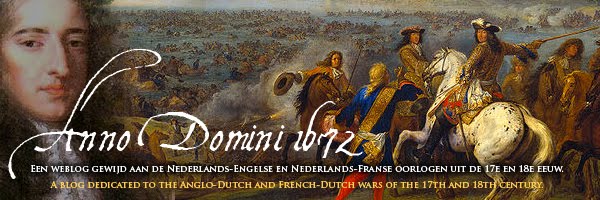
Om de vrijdag mee te beginnen, een deel uit een interview dat Chandler had met de Napoleonic Wargame Club:
DC: I find the Marlburian period is the most satisfactory challenge as a writer of military history. Of course I have written more on the Napoleonic era - and I love it very dearly - but there is something very special about 'Milord Duke'. It is a difficult period to work because there is a shortage of documents, but makes it more of a challenge. In that respect I was most pleased to have discovered most of the documents of Private Sentinel John Marshall Deane of the 1st Guards. (S.A.H.R., Special Publication No.12, 1984). [Society for Army Historical Research - Rob] That was exciting. I also felt one of the same type of John Wilson, 15th Foot, who calls himself an '...Old Flanderkin Serjeant' (soon to be published in the 'Military Miscellany II' of the A.R.S.'). Indeed, there are many problem of this period - including a bad habit of certain previous writers regarding their reliability, originality or plagiarism. However, I love this era.
There are other reasons than far purely academic interests. Marlborough was the greatest British soldier of all time. The nation had only become a 'great power' in Europe - and then in the World. For 250 years, therefore - for better or for worse - he had created the greatest empire of the modern age. This clearly fascinates me, and I am an Englishman too! All being well, next year should see a new book of mine being published by Spellmount. I have been seriously ill for six years, which has effectively stopped my writing 'production'. Little by little I have slowly improved in my mental capabilities and my thanks go to many kind people have helped me recover. Christopher L. Scott has kindly helped me with the rubrics, spellings and syntax in my new volume, or rather a selection. It will be about the periods of King William III and John Churchill, Earl and then first Duke of Marlborough, mainly from 1697 to 1704 inclusive. It will be called: 'Blenheim Preparations'. However, I have not been wholly idle since 1995. I have been encouraging various publishers, and as a result I have persuaded them to re-publish no less than 14 of my earlier volumes. Naturally, I was not over-interested in re-prints, and only for truly 'new' work; but I was partially wrong. One friend has taught me the realities of [a] lasting book, 'Almost anyone can publish a sound book or two,' he told me; 'however, it is more important to be re-published!' He was right, too.
RH: I understand that you are a big fan of Marlborough and of Napoleon. Could you use three adjectives for each man that would best summarize their character?
DC: Marlborough: 'INNOVATIVE' - 'FLAMBOYANT' - 'HENPECKED', thus 'The Twin Captains' (including with Prince Savoy of Savoy); and 'Creator of the Second British Empire'.
Napoleon: 'BELOVED' - 'STARTLED' - 'INSPIRED', thus 'A great, bad man.' (as Lord Clarendon's description of Oliver Cromwell); and who ultimately failed (how brilliant his later propaganda).
Link!
Werkelijk ongelofelijk dat die man hier mee weg komt. Het doet me vooral denken aan de reclame 'Wij van WC-eend, adviseren WC-eend'.
Het voordeel van een klein land is toch wel een aangeboren relativeringsvermogen en van mijn land in het bijzonder, het openstaan voor vreemde invloeden. Is dit nu typisch iets engels ofzo?
Hoe moet het dan wel: nou, het moet zoals van Deursen (Hoogleraar bij de VU) het doet over het Noord-Hollandse dorpje Graft. Met ongelooflijk veel (archief)onderzoek is het hem goed gelukt een beeld neer te zetten van een eind 17e eeuws dorp in de Hollandse polder. De enige kritiek dien op hem is gegeven, is dat hij zijn eigen geloof een beetje teveel liet doorschemeren in zijn sympathieën.
~
Honestly, I just can't understand how Chandler (English, writing using English sources, by a biased family member) gets away with this. Even in his own time Marlborough was not without criticism (like Jonathan Swift, who hated the Dutch) but this limitless adoration and the resulting biased histography is below any academic standard.
Thankfully, the work by VU University Amsterdam Professor van Deursen shows how real research is done.
A review:
Een dorp in de polder is an exceptional book which shows a community typical of many other villages in the Netherlands during the famous Golden Age.
Excerpt
The people of Graft populating the pages of this book were seventeenth-century folk. What they thought and believed, what they ate and drank, what they hated and loved, what they owned and lacked was all enshrined in the communal experience of their age, and of their age alone? Graft was a fairly prosperous village whose inhabitants lived largely from the sea. More of them were poor than rich, but the majority fell between these two extremes. Almost everybody owned a small boat, almost nobody a coach-and-four. The village boasted half a dozen churches of three different denominations, and on Sundays all of them were packed. A great many people learned to read, but very few used reading as a gateway to higher education.




Uit nieuwsgierigheid dat boek van Chandler over Marlborough maar eens aangeschaft en op de grote stapel gelegd. Wat veel Engelsen overigens ook (graag) over het hoofd zien, is dat het dankzij "onze" Willem van Oranje was dat ze meegezogen werden in de vaart der volkeren. Zonder de hele Glorieuze Revolutie is het best denkbaar dat ze zich afzijdig hadden gehouden van het gedoe op het continent, of in ieder geval niet een hoofdrol hadden gespeeld. Misschien waren ze wel de lachende derde geworden, en zijn ze dat niet alsnog geworden?
BeantwoordenVerwijderenZeer benieuwd naar je bevindingen!
BeantwoordenVerwijderen